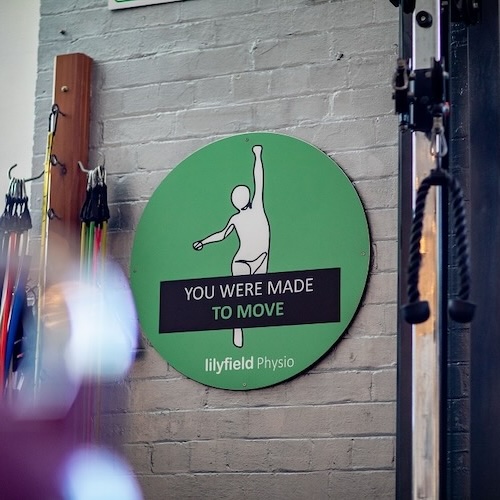Book a Physio for Plantar Fasciitis
Our team of experienced physiotherapists, led by Kam Bhabra (with over 15 years of experience working in elite sports), and Karen Westcott (Principal Physiotherapist), offers a comprehensive approach to plantar fasciitis care. Together, we use a combination of hands-on treatments, exercises, and education tailored to your needs.
Whether you’re dealing with heel pain from overuse, foot mechanics, or age-related factors, we’ll guide you through a personalised recovery plan. Book a physio appointment with us today and start your journey to pain-free movement.
You’ll find us at:
- Mon – Tue: 7:00 AM – 7:00 PM
- Wed: 7:00 AM – 7:30 PM
- Thu: 7:00 AM – 6:00 PM
- Fri: 7:00 AM – 4:00 PM
- Sat: 8:00 AM – 1:00 PM
- Sun: Closed

How We Treat Plantar Fasciitis
Our plantar fasciitis treatment includes a variety of physiotherapy techniques aimed at alleviating pain, restoring foot function, and preventing future injuries. Here’s how we approach plantar fasciitis treatment:
Stretching exercises are designed to target the plantar fascia, calf muscles, and Achilles tendon. These stretches aim to improve flexibility and reduce tension in the affected areas. By lengthening the tissues that contribute to plantar fasciitis, these exercises help decrease strain on the plantar fascia, especially after periods of rest or prolonged standing. Regular stretching can ease pain and improve mobility, particularly in the morning when symptoms tend to be the most severe.
Strengthening exercises focus on the muscles in your feet, ankles, and legs, helping to provide better support for the plantar fascia. Strengthening the intrinsic foot muscles and the calf muscles can alleviate pressure on the plantar fascia, reducing pain over time. These exercises are crucial for stabilising the foot and improving overall balance, which can prevent the recurrence of plantar fasciitis.
Manual therapy involves hands-on techniques, such as soft tissue mobilisation and joint manipulation, to improve mobility and reduce pain. For plantar fasciitis, our physiotherapists may use massage techniques, myofascial release, or trigger point therapy to relieve tightness in the plantar fascia and surrounding tissues. Joint mobilisation may also be used to improve the function of the foot and ankle joints, helping to restore natural movement and reduce discomfort.
Athletic taping, including the Low Dye technique, is commonly used to support the arch and reduce stress on the plantar fascia. Taping helps control excessive pronation (when the foot rolls inward), which is often a contributing factor to plantar fasciitis. By supporting the foot in a more neutral position, taping provides immediate relief from pain, particularly during activities that involve standing or walking for extended periods.
A comprehensive gait analysis helps identify any abnormal movement patterns that could be contributing to plantar fasciitis. Our physiotherapists assess how you walk, looking for signs of overpronation, poor alignment, or other biomechanical issues. Based on the findings, we can provide corrective strategies, such as targeted strengthening exercises or postural adjustments, to alleviate stress on the plantar fascia and improve your walking mechanics. This approach can help prevent future flare-ups and support long-term recovery.
Initial Consultation: $160
Review Assessment and Consultation: $155
Standard Consultation: $125
Please note: A cancellation fee of $83 applies for cancellations within 24 hours of the scheduled appointment. Private health rebate applicable.
What Causes Plantar Fasciitis?
Plantar fasciitis can develop due to a combination of factors that place excessive strain on the plantar fascia, leading to inflammation and pain. The main causes include:
- Prolonged walking, running, or standing, especially on hard surfaces, puts repetitive strain on the plantar fascia.
- This overuse leads to inflammation and microtears, which causes pain, especially after periods of rest.
- Flat feet (overpronation): Causes the arch to collapse during walking, increasing tension on the fascia.
- High arches (underpronation): Distributes pressure unevenly, also stressing the plantar fascia.
- Abnormal gait patterns, such as excessive foot rolling, can worsen the condition.
Most common in individuals aged 40-60, as plantar fascia tissue loses elasticity with age.
Older individuals are more likely to develop chronic plantar fasciitis due to decreased tissue repair capabilities.
Extra body weight increases the pressure on the feet, especially the plantar fascia.
Excessive weight-bearing contributes to the breakdown of the fascia and impedes healing.
High-impact sports like running, ballet, and aerobics put repetitive stress on the feet, particularly on hard surfaces.
Occupations requiring prolonged standing (e.g. retail, healthcare, teaching) also increase the risk of plantar fasciitis due to constant foot pressure.

Ready to Move Pain-Free Again with Expert Physio for Plantar Fasciitis?
If heel pain from plantar fasciitis is holding you back, our skilled physiotherapists are here to help. Through targeted treatments and expert advice, we focus on providing lasting relief, improving function, and helping you return to the activities you enjoy. Book your physio appointment today and take the first step toward pain-free living.
Ongoing Rehab & Exercise Classes
In addition to one-on-one physiotherapy, Lilyfield Physio offers group rehab and exercise classes designed to support your long-term health. These classes focus on building strength, improving mobility, correcting movement patterns, and maintaining joint resilience.
With a wide range of class types and convenient times, there’s plenty of opportunity to continue progressing safely under expert guidance.
Meet Our Plantar Fasciitis Physios
Lilyfield Physiotherapy is proud to offer some of Australia’s most experienced and highly qualified physiotherapists, committed to helping you move better, faster.
FAQs
Plantar fasciitis physio involves targeted treatments aimed at relieving pain, improving flexibility, and strengthening the foot and leg muscles to prevent further injury. It includes stretching, strengthening, manual therapy, and education on activity modification.
Yes, physiotherapy is highly effective in managing plantar fasciitis. A physiotherapist will use a combination of stretching, strengthening exercises, manual therapy, and taping to reduce pain, improve mobility, and prevent recurrence.
A physiotherapist can provide a variety of treatments for plantar fasciitis, including personalised stretching exercises, strengthening programs, manual therapy, taping, orthotics advice, and patient education on activity modification to aid recovery and prevent further injury.
Yes, seeing a physiotherapist for plantar fasciitis is highly recommended. Early intervention with physiotherapy can significantly reduce recovery time and help manage the pain, improve foot function, and prevent the condition from becoming chronic.
Recovery from plantar fasciitis can vary, but with appropriate physiotherapy, many people see improvement within 6-18 months. Early intervention can shorten recovery times, but chronic cases may take longer.
If you experience persistent heel pain, especially after long periods of rest or upon waking, it's a good idea to see a physiotherapist. Early intervention can help prevent the condition from worsening and speed up recovery.
Both physiotherapists and podiatrists can help with plantar fasciitis, but physiotherapists focus on improving movement patterns, strengthening muscles, and providing rehabilitation, while podiatrists may focus more on footwear and orthotic solutions. If you're unsure, starting with a physio can be a great first step for a comprehensive treatment approach.
If you have private health cover and subscribe to the “extras” cover, you may be eligible to claim part of your treatment fee. There are many different schemes and you are best advised to check your level of cover with your insurer. Most health funds are online with HICAPS, which allows you to claim your health fund rebate immediately at our clinic, leaving only the gap for you to pay. You will need to bring your health fund card with you.
Yes, in some cases. Medicare now offers chronic disease management referred to as Enhanced Primary Care (EPC) plans, for people with chronic conditions. This allows for a Medicare rebate, for up to 5 physio or exercise physiology treatments a year. You must be referred by your GP and you need to bring your Medicare card with you. If you have any queries regarding this service, please don’t hesitate to speak with our staff or discuss your eligibility with your GP.
You are welcome to wear whatever you are most comfortable in. For Exercise sessions and classes, please wear exercise clothes and a pair of socks, making sure you able to move freely
Please bring along any doctor’s referral letters, scan or x-ray results and your private health insurance card so you can claim for your treatment on the spot.
Your Physiotherapist will complete a thorough assessment of your complaint and then provide you with a preliminary diagnosis and appropriate treatments based on their findings. This will generally consist of some hands-on treatment, advice and often you will receive some exercises to do at home. Your Physiotherapist will also discuss with you their plan for management which will include likely recovery time, number of sessions required and future exercise advice.
We accept cash, EFTPOS, VISA and MasterCard. If you bring your private health insurance card with you, we can process an on-the-spot claim via our HICAPS terminal and you will then only need to pay the gap fee.
Yes. Physiotherapists can refer patients directly for MRI scans, provided they have completed the appropriate training and accreditation. Your physiotherapist will determine if an MRI is necessary based on your assessment and condition.
Yes. Physiotherapists can provide medical certificates (sick notes) for issues related to musculoskeletal or physical health concerns. These certificates can cover time off work, recommendations for modified duties, or clearance for returning to regular activities.
We accept referrals for Compulsory Third-Party Insurance claims. Once you have seen your GP and received a claim number, we are able to send any invoices directly to the insurer. If you need to start treatment before you have a claim number, we shall ask you to cover the cost of the treatment and claim from the insurer later.
You can cancel and re-schedule by calling our rooms on 9810 2203. For after hours, we have an answering machine service for you to leave a message. Our receptionist will contact you shortly after it is received to confirm cancellation or to help you re-schedule.
We request that if you are unable to make a consultation or class that you let us know at least 24 hours prior to your appointment so that someone else can use your treatment time.
We have a cancellation fee policy for late cancellations or missed appointments.
This practice takes great care to ensure that our information records are accurate and are treated with full regard to the privacy of our patients. We only collect information from our patients that is necessary for good health care and aim to ensure that any information we hold is accurate, complete and up-to-date.
The health information we hold helps us provide our patients with the best possible health care, and is disclosed only to others involved in your treatment, such as your doctor. If we need to disclose information about you to people other than those associated with your treatment, we will seek your permission first.
Occasionally we may be involved in research on health issues. If any data from this practice is used in research, it will not include information which identifies our patients.
This practice is bound by the Privacy Amendment (Private Sector) Act 2000, and operates in accordance with the Code of Conduct of the Australian Physiotherapy Association. If you would like to discuss any aspects of our privacy policy, or review your health records, please advise your treating Physiotherapist or Exercise Physiologist.













